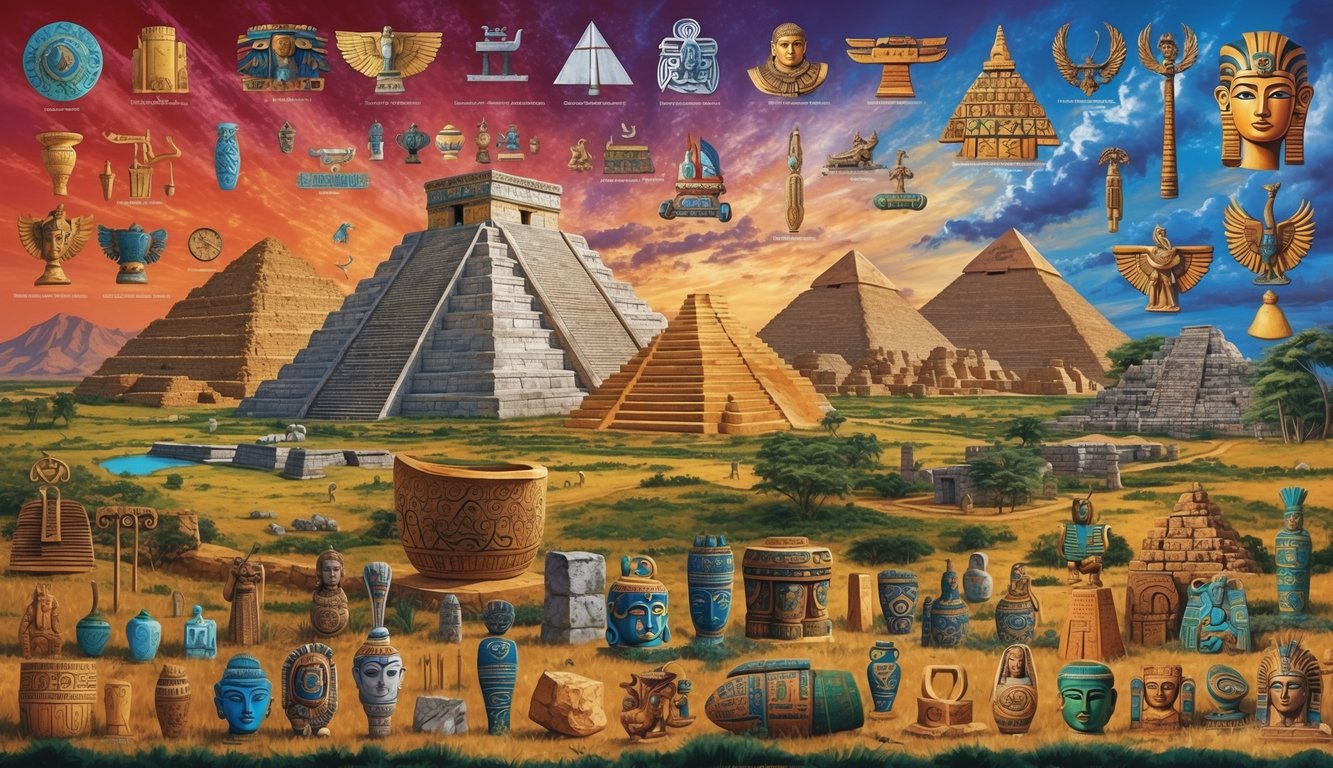Don’t Miss Out On This Unique Astrological Opportunity
Are you tired of spinning your wheels and getting nowhere? Simply put, you’re out of sync: you’re out of alignment with your astral configuration.
But: there’s a kind of map that can help you reclaim your alignment. Think of it as your own personal blueprint to success and happiness: a blueprint that will help you live your most amazing life.
Get started here.
In the story of Genesis 16, you meet compelling characters like Sarai, Abram, and Hagar.
Sarai faces a deep personal struggle with barrenness, leading her to make difficult decisions.
Hagar, an Egyptian maidservant, plays a crucial role as she becomes the mother of Abram’s first son, Ishmael.
This chapter weaves together themes of hope and desperation, revealing complex human emotions and relationships.
Genesis 16 highlights a significant moment where divine intervention changes the course of lives and history. The story unfolds with an angel speaking to Hagar, offering promises and guidance during a time of uncertainty.
This encounter marks a turning point, providing comfort and assurance of a brighter future for her son, Ishmael.
Understanding the events in Genesis 16 also offers insight into the cultural and theological context of the time.
The dynamics between Sarai, Abram, and Hagar are rich with lessons about faith, promise, and the challenges faced by these early biblical figures.
This story continues to inspire reflections on morality and human frailty that are still relevant today.
Key Takeaways
- Genesis 16 explores complex human relationships and emotions.
- The chapter includes a pivotal divine encounter with Hagar.
- Themes from the story remain impactful in cultural and theological discussions.
Characters and Their Relationships
In Genesis 16, you encounter complex dynamics involving Sarai, Abram, and Hagar.
Sarai and Abram face a difficult decision about having children, while Hagar, their Egyptian servant, becomes central to their story.
The tension between the characters is heightened by the birth of Ishmael.
Sarai and Abram’s Dilemma
Sarai, Abram’s wife, faced the frustration of being unable to have children.
This was a significant challenge as producing an heir was essential. Sarai made a difficult decision to offer her servant Hagar to Abram, hoping to build a family this way.
This decision wasn’t easy.
You can sense Sarai’s desperation and desire to fulfill her role as a wife and build a family.
Abram agreed with Sarai’s plan, which showed both his support for Sarai and his own desire for a child.
The complexity of their marriage and the pressure to have children are clear.
This choice would lead to significant emotional challenges and affect their relationships with each other.
Hagar: The Egyptian Maidservant
Hagar was Sarai’s Egyptian maidservant.
She found herself in the middle of Sarai and Abram’s personal struggle.
When Sarai offered Hagar to Abram, it changed Hagar’s role from servant to Abram’s secondary wife. Hagar conceived a son, which shifted the household dynamics significantly.
After conceiving, Hagar’s relationship with Sarai became strained.
Sarai felt despised and looked down upon by Hagar.
This situation caused much tension, with Sarai feeling hurt and Hagar dealing with her new role and status.
You can observe how complex the relationships became when roles and expectations changed, underscoring the impact on personal connections.
The Birth of Ishmael
The birth of Ishmael was a turning point.
Ishmael was Abram’s first son, born due to Sarai’s plan.
This event brought joy but also significant conflict within the household.
Sarai found herself increasingly unhappy with the dynamics between Hagar and herself.
Abram’s relationship with his son Ishmael was significant, as Ishmael became part of God’s covenant promises.
Yet, it also complicated his relationship with Sarai and Hagar. Hagar’s status as a mistress and mother to Ishmael brought her some recognition, but it also left her feeling judged and blamed.
The relationships around Ishmael’s birth illustrate the complexities of family, promises, and human emotions within this biblical narrative.
Divine Encounters and Promises
In Genesis 16, you see profound moments where God’s presence and promises drastically impact the lives of those involved.
The interactions in this chapter shed light on a divine encounter, important messages, and the power held in names.
The Angel of the Lord
In the wilderness, Hagar encounters the Angel of the Lord. This isn’t just any meeting; it’s a significant divine appearance. The Angel’s presence marks a crucial turning point for Hagar as she flees from Sarah’s harsh treatment.
You witness here how God intervenes directly in human affairs through His messengers.
This encounter serves as a moment of hope for Hagar, who feels unheard and invisible.
The Angel brings reassurance, showing that God is mindful of her and her struggles.
God’s Message to Hagar
When you explore God’s message to Hagar, you find it offers more than comfort. The Angel tells Hagar to return and submit to Sarah, but this isn’t without promise.
There is a powerful announcement about her future son, Ishmael, signifying that God hears her affliction.
God promises Hagar that her descendants will be too numerous to count, providing a glimpse into the wider story of God’s plan for a people. This message emphasizes God’s commitment to His promises and His care for those in distress.
The Significance of Naming
Hagar’s experience at Beer Lahai Roi leads her to name God as “El-Roi,” or the God Who Sees Me.
This naming underscores an intimate acknowledgment of God’s awareness and care. It highlights her realization that even in her lowest moment, she is seen and valued.
Names in this narrative carry great weight.
Hagar’s encounter not only results in a name for God but also for her son, Ishmael, meaning “God Hears.” Each name solidifies the events in your mind, marking them as milestones of divine interaction and promise fulfillment.
Theological and Cultural Context

In Genesis 16, key themes include the importance of children in Canaan, the role of women in ancient stories, and the impact of Hagar throughout scripture.
Each offers a glimpse into the complex interactions of the time.
The Significance of Offspring in Canaan
The desire for offspring in Canaan played a big role in everyday life.
Children were seen as blessings and a way to secure one’s legacy.
They were inheritances and often the foundation of family continuity.
In Genesis 16, Sarai’s inability to conceive caused her deep personal pain, leading her to offer her Egyptian maidservant, Hagar, to Abram.
This was not uncommon in Canaan when a wife was barren.
However, it stirred up tension and changed relationships, especially between Sarai and Hagar, her new rival.
The Role of Women in Ancient Narratives
Women in ancient Canaan often held key roles in family and narratives, even if they weren’t always the main focus.
They influenced the unfolding events through their actions and decisions.
In Genesis 16, Sarai and Hagar’s actions drive much of the plot.
Sarai’s decision to give Abram Hagar as a wife and Hagar’s reaction when she became pregnant show the influence women had in these stories, reflecting the complex dynamics between wives and maidservants.
Hagar’s Legacy in Scripture
Hagar, an Egyptian maidservant, became a significant figure in the Bible.
Her story addresses themes of affliction and resilience.
After fleeing due to mistreatment, she encountered God’s promise: her son Ishmael would be a “wild donkey of a man,” with descendants too numerous to count.
Hagar’s story highlights issues of belonging and the hostility she faced, yet she is also remembered for her faith and strength.
Her legacy extends beyond Genesis, reflecting broader themes of survival and divine encounter in the face of misery.
Cultural and Lasting Impact

Genesis 16 has influenced literature and modern discussions.
It addresses themes of suffering, wrongdoings, and cultural implications surrounding Hagar, Sarai, and Abram.
Literary Influence of Genesis 16
The story of Hagar, Sarai, and Abram has shaped literary works deeply.
This narrative, with its themes of wilderness and suffering, is often explored in Bible commentaries and retellings.
The birth of Ishmael introduces discussions about legacy and lineage.
Writers have creatively used Hagar’s Egyptian identity and her encounter at Beer-Lahai-Roi to emphasize themes of exile and return.
These elements appear in various texts, where Hagar’s despised status becomes a symbol of oppression.
Her bearing of Ishmael, a “wild man,” is depicted metaphorically in numerous works.
This story’s moral dilemmas and emotional depth offer rich material for writers.
Genesis 16 in Modern Discourse
Today, you see Genesis 16 discussed in contexts of social justice and cultural analysis.
Hagar’s experience serves as a lens for examining wrongs and marginalization.
Her story highlights issues of power, oppression, and the ways in which marginalized individuals navigate difficult circumstances.
In many interpretations, Hagar’s encounter with the divine emphasizes both justice and compassion, resonating with broader theological themes.
Similarly, discussions on Ezekiel 25 17 meaning often explore themes of divine judgment and righteousness, connecting biblical narratives to modern conversations on justice.
Debates focus on her status as an outsider in the Bible, highlighting her challenges in both personal and societal terms.
These conversations often refer to footnotes from biblical texts, providing historical context.
Genesis 16 is part of broader discussions about power dynamics and relationships, drawing parallels with modern-day issues.
It invites reflection on suffering, identity, and resilience.
As the narrative unfolds, Hagar’s story prompts questions about empathy and human rights, keeping it relevant in ongoing dialogues.
Frequently Asked Questions

Genesis 16 explores themes like faith, family, and human decisions.
It showcases the struggles of Abram, Sarai, and Hagar and the lessons that emerge from their actions and choices.
What is the significance of the events in Genesis chapter 16?
Genesis 16 tells the story of Sarai and Abram’s impatience with God’s promise.
Sarai suggests that Abram have a child with Hagar, her maid, to build a family.
This decision leads to unintended consequences, highlighting the challenges of human decision-making and testing faith in divine timing.
How do different Bible translations like NIV and NLT present Genesis 16?
Different Bible translations such as the New International Version (NIV) and New Living Translation (NLT) use varied language but deliver the same core events.
These translations can provide slightly distinct perspectives, making it easier to understand the emotional and cultural nuances of the narrative.
In the narrative of Genesis 16, what lessons are we meant to learn?
Genesis 16 teaches about the risks of impatience and trying to fulfill divine promises through human efforts.
You learn about the importance of trust and faith in divine plans, even when circumstances seem challenging or unclear.
The story invites reflection on how personal choices can impact others.
What does the relationship between Sarah, Hagar, and Abram teach us in Genesis 16?
The relationships between Sarah, Hagar, and Abram reveal intricate dynamics of power, jealousy, and compassion.
Their interactions show how decisions driven by desperation can lead to conflict and hardship.
You can see the human side of their mistakes and learn about empathy and forgiveness within difficult situations.
What is the cultural and historical context behind the story in Genesis 16?
In the historical context of Genesis 16, it was common for barren couples to use surrogates to continue the family line.
This cultural practice underscores the desperation Sarai felt.
Understanding these customs helps you see the expectations and pressures Sarai and Abram faced in their society.
How have biblical commentators historically interpreted the interactions in Genesis 16?
Biblical commentators have often focused on themes of faith and human error found in Genesis 16.
Historically, these interactions have been interpreted as lessons in patience.
They also offer guidance on handling doubt and seeking strength through faith rather than personal schemes.



